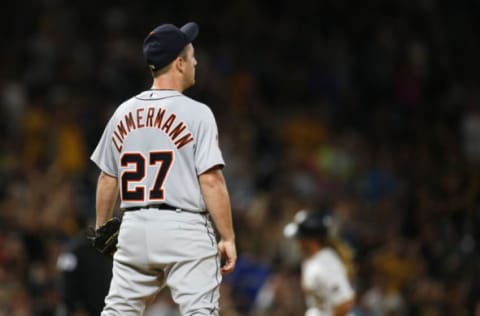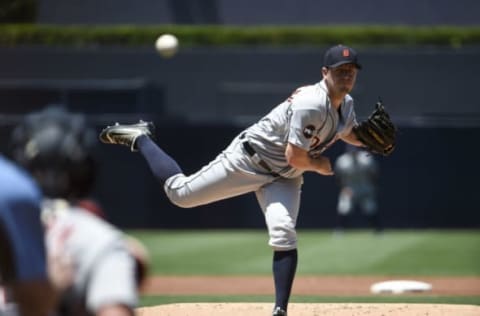Detroit Tigers: Jordan Zimmermann bounce-back is vital for franchise’s long-term outlook


Detroit Tigers starting pitcher Jordan Zimmermann once again enters the coming season as a bounce-back candidate. A turnaround year from the veteran would be significant.
Detroit Tigers fans haven’t seen the best out of Jordan Zimmermann in his time in the Motor City.
Save for a 10-start stretch to begin his Tigers career that saw the veteran turn in a 2.58 ERA in 66.1 innings (which included a 19.1-frame scoreless streak), Zimmermann has struggled mightily.
In two seasons in a Detroit uniform, the right-hander has thrown 105.1 and 160 innings respectively in each of the last two years.
His overall numbers haven’t exactly been easy on the eyes.
Jordan Zimmermann 2016: 105.1 innings, 1.3 fWAR, 5.64 strikeouts per nine innings, a 7.7 swinging strike percentage, a 1.37 WHIP, 2.22 walks per nine innings, 1.20 home runs allowed per nine innings, a 4.87 ERA, a 4.42 FIP, a 4.84 xFIP and a 4.81 SIERA.
Jordan Zimmermann 2017: 160 innings, 1.1 fWAR, 5.79 strikeouts per nine innings, a 8.1 swinging strike percentage, a 1.55 WHIP, 2.48 walks per nine innings, 1.63 home runs allowed per nine innings, a 6.08 ERA, a 5.18 FIP, a 5.41 xFIP and a 5.22 SIERA.
For reference, Zimmermann’s 2016 BABIP checked in at only .304. His 2017 number in the category finished at .330.
For his career, the veteran has a .299 BABIP, including a .302 number in each of his last two seasons with the Nationals.

The contract
Speaking of Washington, Zimmermann was excellent in his time with the National League East franchise.
From 2011 to 2015, his fWAR routinely topped the 3.0 mark, including the 2014 season when he notched a 5.3 stat in the category.
During each year the same span, the starter posted a sub-4.00 (and in some cases sub-3.00) mark in all four prevention categories—ERA, FIP, xFIP and SIERA.
Based on this production, Zimmermann’s five year, $110 million dollar contract (per Spotrac) looked more than reasonable from a value standpoint.
However, it hasn’t exactly worked out in Detroit.
Now, Zimmermann has gone from the front-line starter who seemed to be the long-term replacement for Max Scherzer and David Price on a contending club, to a struggling starter on a rebuilding team.
The retooling Detroit Tigers are now left with a pitcher who has—according to Spotrac—three years and $74 million left on his deal.
What’s more, the same publication states that the 31-year-old has a full no-trade clause through 2018. During the 2019 and 2020 campaigns, it shifts to a “10 team trade approval list.”
From a long-term standpoint, moving Zimmermann’s contract would certainly help the Tigers.
Deals involving players with full no-trade protection certainly aren’t unheard of, but if Detroit wants to flip Zimmermann, they’ll need to rehab his trade value first.

Why a bounce-back season is key
Heading into the 2018 season, the Detroit Tigers will need a bounce-back season from Jordan Zimmermann.
Not only does he help hold down the rotation for Detroit until Franklin Perez, Beau Burrows and Grayson Long are ready—which may not be that far off—he could also develop into a trade chip.
That’s obviously easier said than done.
Still, there’s some reason to believe Zimmermann could improve somewhat next season.
Reasons to believe Zimmermann could be better in 2018
His .330 BABIP, a career high, obviously contributed to the veteran’s struggle.
What’s more, the hurler actually missed bats with slightly more regularity in 2017, upping his swinging strike percentage to 8.1% from 7.7% in 2016.
By comparison, the starter’s swinging strike percentages during his run of form with the Nats were 8.0%, 8.3%, 8.8%, 10.3% and 8.4%.
He’s used to finding success with a similar swing-and-miss numbers.
If Zimmermann can post similar stats where missing bats are concerned and keep the ball on the ground more, he should have a chance to find more success.
In 2017, the pitcher turned in a 33.2% ground ball percentage that was easily the lowest of his Major League career.
However, at the very least if the veteran pitcher can perform at a level somewhere between his recent struggles and his excellent years in Washington, Zimmermann could conceivably help another team’s rotation.
Even in this scenario, Detroit might have to eat some salary to help facilitate a trade, but if they can get an intriguing prospect or two and some payroll relief in exchange for the ex-National, it will be a definite win for the franchise.

Kick-starting the rebuild
Baseball is a fickle sport, leaving the door open to pretty much anything happening.
That’s not saying the Detroit Tigers are going to contend and win the pennant next season.
However, a rebound season from Zimmermann, along with significant steps forward from fellow starting pitchers Daniel Norris and Matthew Boyd (things that aren’t too far out of the question), Detroit could punch above their weight and win a few more games than expected.
This, in turn, would help expedite the rebuild process.
Not only would a bounce-back campaign from Zimmermann help kick-start the rebuild, it would also help save the bullpen.
Detroit will enter 2018 with a young bullpen that could, at times, feature the likes of Joe Jimenez, Jairo Labourt, Bryan Garcia, Zac Reininger and Mark Ecker among others.
The bullpen as a whole could get even younger if closer Shane Greene and presumptive setup man Alex Wilson are traded this offseason.
Obviously getting all those pitchers acclimated to the Majors is key for the future, but the Tigers probably don’t want to overwhelm the younger relievers with consistent work if the starters fail to pitch deep, or even moderately deep, into games.
Next: Breaking down Detroit's financial outlook
Having Zimmermann somewhat return to form would help take the pressure off the young bullpen.